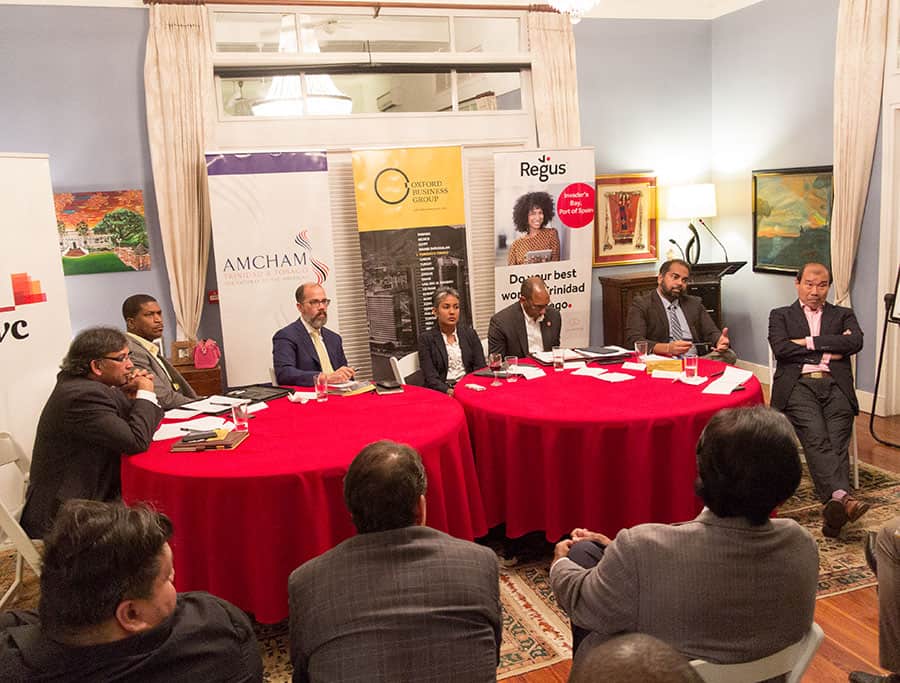
Above: The Oxford Business Group roundtable’s panel. Photo by Mark Lyndersay.
BitDepth#1152 for July 05, 2018
June 12 was an ordinary enough day, the morning sunshine surrendering to brooding skies in the afternoon and eventually, a chilly rain.
A typical tropical day, but one that both the US Embassy system and the UK Ambassador to TT decided would be a good one to talk about the financial technologies that are lurking just off the breakwaters of our island nation.
The 600 words of notes I took at the Oxford Business Group’s roundtable are closed to me after it became clear that journalism wasn’t expected at the evening meeting.
The next morning, Haris Pejicic, Editorial Manager of OBG, emailed me to confirm that the discussion was closed to reporting and held “en petit comité.”
There are no such restrictions on the morning webinar hosted that morning by Global Innovation through Science and Technology.
GIST is an initiative of the US Department of State that stokes conversations about innovation with an emphasis on emerging economies.
Leading that online discussion was Viktor Brandtneris, owner of the Brandtneris Consulting Group, and he was blunt about the coming disruptions in the financial sector.
“In ten years,” Brandtneris warned, “your bank won’t look anything like it looks today.”
“I think there will always be a role for banks,” he allowed, “particularly for large transactions. Banks are going nowhere, but they are certainly nervous about what’s going on.”
It’s likely, he believes, that banks will consolidate around these new technologies.
“Historically,” he said, “governments don’t like to let go of the banking process.”
The earliest disruptions he sees coming in the disintermediation of the financial sector, a massive reduction in the costs of moving money around the world and the coming of smart contracts.
These contracts will use blockchain technology to transparently automate payments for projects once milestones or performance indicators are achieved.
“Look for situations where there are a lot of institutions touching the process,” Brandtneris said. Those will be the first to be cut, along with the expenses they introduce, in a world of direct transactions and open accountability.
When all parties involved in a contract can see the steps that mark fulfilment of responsibilities and the release of payments, business is greatly lubricated and transparency becomes an integral part of the business process.
“IOT sensors can track the status of perishables and product as it moves along the value chain,” said Brandtneris, describing one example of open reporting for business fulfilment.
Some early Fintech initiatives seem to have mutated into established patterns.
“I think crowdfunding has peaked,” he said.
“It seems like platforms like Kickstarter are being used as platforms to test the reaction to a product rather than bootstrapping a marginal startup. The ones that win, win very big, but the others don’t seem to do very well.”
Fintech doesn’t always go down well in emerging nations. Among the many fingers probing around in business pies are those engaged in graft and bribery.
Speeding up processes doesn’t end the demands of bureaucracies, but it can radically change the time that governance procedures demand of business processes.
According to webinar participant Samer Yousif, “What we’ve actually seen in the Fintech industry relating to bureaucracy, is that because these services aren’t operated by large banks and financial institutions which are more likely to be influenced by government influence.”
“Startups which are more focused on increasing users and profits for their company, are able to sidestep some of the challenges that the established financial industry has faced.”
Trinidad and Tobago, meanwhile, seems determined to head in the opposite direction.
There is no shortage of ideas for innovation in TT, but the will to even explore, far less implement, even at the level of sandboxed test projects, simply isn’t there in governance.
While other Caribbean nations are examining and even embracing the tools of financial technology, the country that set out to be the hub of finance in the region is now facing blacklisting by European nations and is hustling to complete its compliance obligations to the Financial Action Task Force.
Having money, which this country has experienced in successive oil booms, is not the same as managing money, which still needs to be demonstrated authoritatively at the level of national leadership.


Actually I think there is a shortage of ideas for innovation n T&T. The main reason for this shortage is that WE have outsourced our creativity to a succession of Governments, which is the group least qualified for the task, because to a large extent politicians filter thoughts and ideas through different lenses like next elections, which group to favour and which to punish and WIIFM, etc, etc. etc.
If we consider the major world wide innovations I cannot think of one that was a result of government creativity. Governments did not create or build, Microsoft, Apple, Facebook,block chain, email, the world wide web in modern times; and in the past did not develop the steam engine, the automobile or the telephone. In little T&T our steelband was created and developed by a cadre of underprivileged, under educated young men with the threat of arrest and jail by the then government, always on their minds. I dare any one to name 5, one handful, of useful innovations in T&T that can be ascribed to government innovation.
To free the creative geniuses in us we must first accept that IT’S UP TO ME and get on with the work at whatever station in life I am placed. One question Why has eTeck park taken years to be completed and occupied. Innovators should have been lined up waiting to take advantage. Instead there is talk of selling off assets.